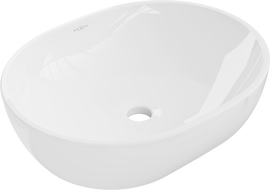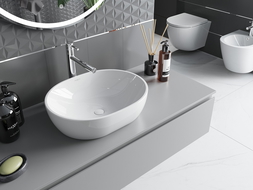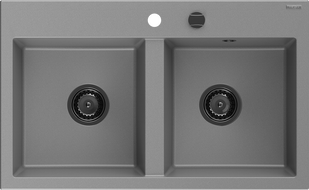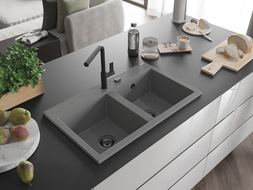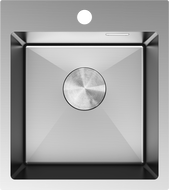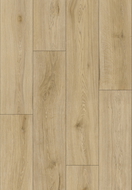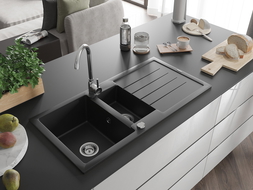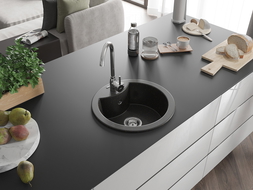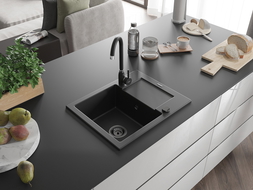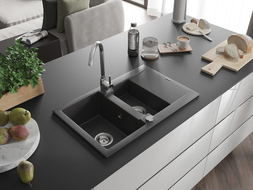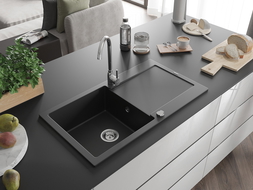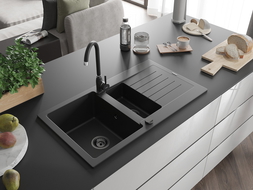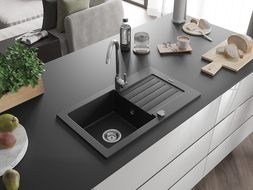
A black sink is undoubtedly a very original idea. It can become a real decoration of the kitchen, especially if it matches the other elements of its equipment. Black granite sinks look best in rooms with a minimalist style. They fit perfectly into industrial-style kitchens, where there are no unnecessary details.
Every sink, regardless of its color, requires occasional maintenance. How to clean a black sink to get rid of visible streaks and discolorations? We answer in the following part of the article.
Take care of the sink's surface if you've opted for a black sink!
A black granite sink is undoubtedly eye-catching. To keep its appearance for years, remember to clean it regularly. All streaks left after washing, soap scum, or limescale will be visible. If you don't remove them immediately, the problem will accumulate. This seemingly small detail can make even a new sink look simply ugly and unattractive.
At mexen.pl, you'll find granite sinks in many colors to choose from. Opt for a solution that will work in your kitchen.
How to properly care for the surface of a black granite sink?
Granite is very resistant to mechanical damage. You can safely place even heavy pots in a sink made of this material. Sharp cutlery or other kitchen accessories won't harm it either. However, pieces of food and all the dirt on knives, forks, or spoons will leave marks on the sink's walls. If uncleaned, it'll begin to discolor over time.
The thing about a black sink is that any residues from food must be removed regularly, which only takes a moment. Simply wipe the sink's interior with a soft sponge dampened with water and dishwashing liquid.
Additionally, it's worth drying the sink's surface. A paper towel works perfectly for this. It helps maintain cleanliness and prevent marks that water might leave on the walls. If you don't do this right away, cleaning a black sink may require a bit more effort.
What not to pour into a granite sink!
It may seem that a black sink is hard to stain, but there are quite a few food products that can leave unsightly stains even on a black surface. Of course, they won't be as visible as on a white or beige sink, but they can stand out on the sink's surface. Products with very strong staining properties include:
- beetroot juice, berries, blackcurrant, red cabbage, or pomegranate juice,
- red wine,
- coffee and tea – especially black and red,
- turmeric, curry mix, paprika powder.
Remember to also care for the sink's surface after washing dishes with these products on them. Otherwise, scrubbing awaits you.
How to clean a black granite sink?
You're surely wondering how to clean a black sink without damaging its surface. Scratches will be much more visible on a black surface than on a sink of any other color, and you certainly don't want that!
After washing, clean the sink with the soft side of a sponge soaked with a little dishwashing liquid - afterwards, dry the surface. It's also a good practice to cover the sink's interior with a special agent that prevents excessive dirt build-up and discoloration.
Cheap and eco-friendly
If you're a fan of eco-friendly solutions, clean the black granite sink with homemade methods, which are also very simple. Make sure you have the following products in your kitchen cabinets:
- vinegar,
- baking soda,
- citric acid.
Just choose one of these products, and the entire process of cleaning the granite sink will take just a few moments.
- Cleaning the sink with vinegar: Mix equal parts of white vinegar and water (e.g., half a glass of vinegar and half a glass of water), and then thoroughly wash the entire sink basin with this solution. Leave the sink for about a quarter of an hour, then rinse its surface thoroughly.
- Cleaning the sink with baking soda: Add a little water to the soda to form a thick paste. It's perfect for scrubbing the sink. However, remember that you must rinse it very thoroughly, as dry soda paste can leave white streaks.
- Cleaning with citric acid: Dissolve citric acid in water and thoroughly wash the sink's interior with this solution, then rinse it with water. This solution is particularly recommended for those who dislike the smell of vinegar, as citric acid is also an effective cleaning method.
An effective method for stubborn stains
If stubborn stains appear on the walls or bottom of the granite sink, you can use an effective homemade cleaner made from a mixture of baking soda and vinegar. The two products react antagonistically, resulting in a rather intense chemical reaction.
Sprinkle baking soda on the stained area, then pour vinegar over it – the combination of acid and base will create a thick foam. The vigorously foaming agent will cause all the dirt to detach from the sink's surface. To finally remove them, just use a soft sponge and warm water. Rinse the cleaning residues thoroughly and dry the sink.
How often should you clean the surface of a granite sink?
A sink, regardless of what it's made from, is worth cleaning every day, at the end of each day.
However, a granite sink has a porous surface, so all regular dirt, such as food residues or washing bubbles, doesn't flow entirely into the sink's siphon. They can settle on the walls or bottom, eventually creating an unsightly residue. To prevent this, remember to clean the sink's chamber thoroughly.
For everyday dirt, just use a soft cloth or a brush with soft bristles, which will help to more thoroughly remove residues stuck to the sink. Cleaning such a surface requires regularity; otherwise, a black granite sink will quickly lose its elegant and stylish look.
What to watch out for when cleaning a granite sink?
The granite sink is very durable and resistant to mechanical damage, but that doesn't mean you don't have to pay attention to what you use to clean its surface. Regular use of improper agents and/or accessories can damage the sink's surface, even if it's made of hard granite.
It's safest to clean the sink with a soft sponge and water with a bit of liquid - the same one you use for washing dishes. If you want your black sink to look like new for a long time, don't use any of the following products to clean it:
- cleaning milks with abrasive particles or powders with abrasive properties. Frequent use of such products can scratch the sink's surface;
- solutions based on ammonia or caustic soda;
- preparations intended for cleaning toilets, hence all caustic, bleaching, and chlorine-containing liquids;
- scouring pads and metal brushes.
Granite is resistant to mechanical damage, but with regular and vigorous scrubbing, even such a hard material can be scratched.
What else can you do to make your black sink look beautiful?
Besides washing the black granite sink, you can engage in additional care activities that will help maintain the chamber in perfect condition. Use this very simple trick! Every few days, wipe the sink's interior with the cooking oil you use daily for meal preparation. This “sealant” makes the sink more resistant to dirt, and the surface will shine beautifully.
Another, less common solution used by housewives and househusbands is cleaning the black sink with a steamer. This way, even persistent dirt can be removed. Additionally, high temperatures help eliminate any potential pathogenic microorganisms. As a result, the kitchen sink surface will become truly clean in a hygienic sense.
How to Clean a Black Sink in the Kitchen – Summary
A black granite sink is an excellent idea for finishing a kitchen, provided you ensure it always looks great. In this article, we've presented a number of ways to properly care for a black sink. In summary, let’s recall:
- if you have hard water in your home, the likelihood of lime scale appearing on the walls of a black sink is virtually unavoidable. Fortunately, water stains don’t penetrate the sink's structure, so they can be easily addressed using ordinary vinegar, which quickly dissolves and removes deposits. If you don't tolerate the smell of vinegar, you can replace it with citric acid;
- daily care of black sinks may simply involve cleaning them with everyday cleaning agents. Dishwashing liquid is enough to wash the entire sink;
- after washing up, dry the sink with a paper towel;
- remember not to leave products with strongly staining properties in the sink, especially fruit and vegetable juices;
- once a week, use home methods for impregnating the sink with kitchen oil;
- avoid using hard scouring pads and detergents containing abrasive particles, which if used regularly, could damage the sink's surface, leaving marks.
As you can see, cleaning a granite sink does not require much effort. You don’t need to buy special products or cleaning accessories. Proper and, above all, regular maintenance of the chamber will make it a real decoration of your kitchen for a long time.


